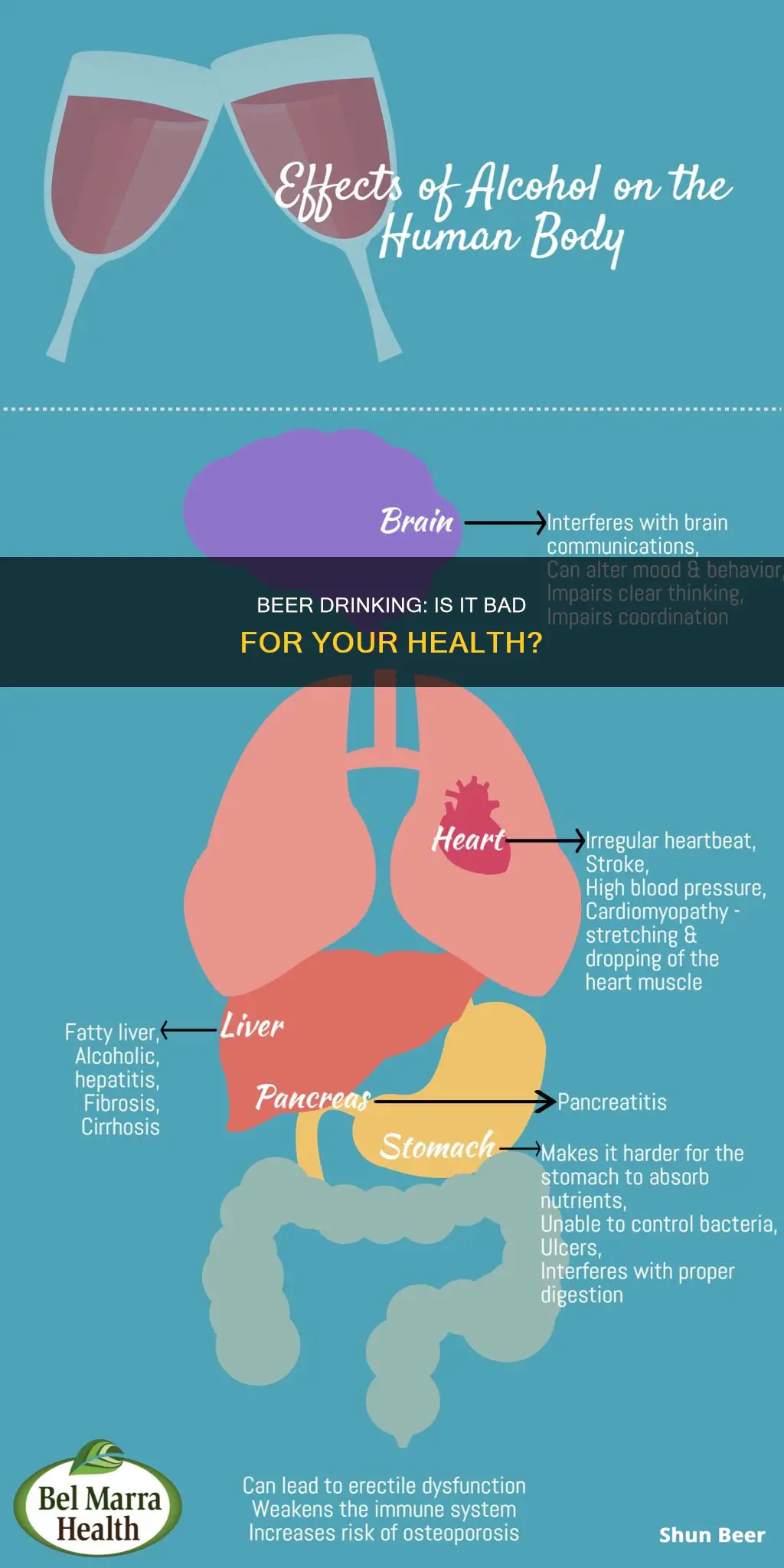
Beer is a popular alcoholic drink, often enjoyed as a relaxing treat at the end of a long day. But is it bad for you? Well, it's complicated. Beer has a relatively low alcohol content of 4-6% (sometimes as high as 12%), but it's also high in calories, with one pint containing around 150 calories. This can lead to weight gain and the infamous 'beer belly'. Beer also contains carbohydrates and can spike your blood sugar, which is not ideal if you're watching your weight. On the other hand, beer contains vitamins and minerals, such as potassium, calcium, thiamine, iron, and zinc, and some studies suggest that drinking beer in moderation may have health benefits, including improved heart health and reduced risk of dementia. However, excessive beer consumption can lead to serious health issues, including liver disease, high blood pressure, stroke, and an increased risk of certain cancers. So, while an occasional beer may not be harmful, excessive drinking is definitely bad for your health.
| Characteristics | Values |
|---|---|
| Alcohol Content | 4-6% on average, but can range from 0.5-40% |
| Calories | 150 calories per pint |
| Nutritional Value | Contains potassium, calcium, thiamine, iron, zinc, and B vitamins |
| Health Benefits | May benefit the heart, improve blood sugar control, support bone density, and reduce dementia risk |
| Health Risks | Increased risk of death, addiction, depression, liver failure, weight gain, cancer, kidney damage, vitamin deficiency, disturbed sleep |
What You'll Learn

Beer contains calories and can lead to weight gain
Beer is often viewed as empty calories, but it does contain some minerals and vitamins, such as potassium, calcium, thiamine, iron, and zinc. However, it is not a good source of these nutrients compared to whole foods like fruits and vegetables. A standard 12-ounce (355-ml) beer contains about 153 calories, and darker beers tend to have even more, ranging from 100 to 300 calories. These calories are different from those in food and tend to accumulate in the midsection, leading to the infamous "beer belly." Generally, people consume more than one bottle of beer in one sitting, making the total calorie count way too high.
The calories in beer are what is known as empty calories, which provide energy but have little to no nutritional value. These calories are typically from the alcohol and carbohydrate content of the beer. The more alcohol in a beer, the higher the calorie count tends to be. Additionally, darker beers tend to have a higher carbohydrate count, which also contributes to the overall calorie content.
The high calorie content of beer can lead to weight gain, especially when consumed in excess. Even light or low-calorie beers can contribute to weight gain if consumed in large quantities. This is because the calories in alcohol are easily absorbed and tend to be stored as fat, particularly in the abdominal area. As mentioned earlier, this type of fat accumulation in the abdomen is the most dangerous and difficult to lose.
To avoid weight gain from beer consumption, it is important to practice moderation. Sticking to one pint of beer and choosing lighter or low-calorie options can help reduce the total calorie intake. Additionally, it is important to be mindful of how these drinks are affecting your body and to track your nutritional intake. For those trying to lose weight, beer consumption may hinder progress, and abstention may be the healthiest choice.
Beer Ads: What Doesn't Work and Why
You may want to see also

Beer can increase the risk of heart disease
Beer is often considered a harmless drink due to its low alcohol content, typically ranging from 5% to 12%. However, excessive beer consumption can have detrimental effects on one's health, including an increased risk of heart disease. Here are four to six paragraphs detailing how beer can increase the risk of heart disease:
While moderate drinking may offer some health benefits, heavy drinking poses serious risks. Excessive alcohol intake can lead to high blood pressure, heart failure, or stroke. It can also contribute to cardiomyopathy, a disorder that affects the heart muscle. Additionally, alcohol consumption is linked to obesity, which brings its own set of health concerns.
Beer, in particular, tends to be high in calories, with a standard 12-ounce beer containing approximately 150 calories. This can lead to weight gain, especially when consumed in excess. Abdominal fat accumulation, often referred to as a "beer belly," is a dangerous type of fat that is hard to lose and can increase the risk of heart disease.
Heavy drinking can damage the heart muscle and increase the risk of stroke, high blood pressure, type 2 diabetes, and atrial fibrillation. The risk is even higher for those who engage in weekly heavy drinking (twice a week) compared to regular drinkers due to sudden fluctuations in blood pressure.
Some studies suggest that moderate drinking may offer a protective effect against coronary artery disease (CAD), the most common form of heart disease. However, this relationship is complex and influenced by various factors such as dietary habits, physical activity, and other individual characteristics. The protective effect of alcohol may be attributed to its ability to increase "good" HDL cholesterol levels and prevent blood clot formation.
It is important to note that the potential benefits of beer consumption are only associated with light to moderate intake. Heavy drinking and binge drinking can have negative health consequences, including an increased risk of heart disease. To maintain a healthy relationship with alcohol, it is recommended to stick to moderate levels of consumption.
Beer and Guaifenesin: Mixing Alcohol and Cough Medicine
You may want to see also

Beer can negatively impact sleep
While beer is often enjoyed as a relaxing beverage, its impact on sleep is more complex. Alcohol, the key ingredient in beer, has a two-fold effect on sleep. On the one hand, it can help individuals fall asleep faster. However, it disrupts the sleep architecture and negatively affects sleep quality.
Rapid Eye Movement (REM) Sleep Disturbance
The presence of alcohol in the system can suppress REM sleep, a vital phase of sleep for cognitive function and memory consolidation. This suppression results in reduced REM sleep time, which typically occurs about 90 minutes after falling asleep. Consequently, individuals may experience daytime drowsiness, poor concentration, and fatigue.
Sleep Quality and Duration
Beer consumption can also lead to non-restorative sleep, leaving individuals feeling unrefreshed in the morning. This disruption in sleep quality can be attributed to the sedative effects of alcohol, which can fragment sleep and reduce overall sleep duration.
Nighttime Insomnia
In some cases, excessive alcohol intake has been linked to nighttime insomnia. This paradoxical effect may be due to alcohol's disruptive impact on sleep architecture, particularly the REM stage, which is crucial for deep sleep.
Recommendations
To mitigate the negative impact of beer on sleep, it is advisable to limit consumption and practice moderation. Additionally, ensuring adequate time for the body to metabolize alcohol before bedtime can help reduce its disruptive effects on sleep. It is also worth noting that individual factors, such as weight, size, and biological sex, play a role in determining the impact of beer on sleep. Therefore, it is essential to monitor personal consumption patterns and their subsequent effects on sleep quality and duration.
To Drink or Not: Beer and Dental Fillings
You may want to see also

Beer can cause vitamin deficiencies
Beer is often viewed as empty calories, but it does contain small amounts of potassium, calcium, thiamine, iron, and zinc. These vitamins are a result of the grains and yeast used in the brewing process. However, beer is not a good source of vitamins and minerals compared to whole foods like fruits and vegetables.
Regular beer intake may increase the body's demand for certain vitamins and minerals, particularly B vitamins, which are needed to metabolise alcohol. The body needs to work harder to absorb these nutrients, and if demands are not met, this can lead to vitamin deficiencies and disturb the body's internal function.
Chronic alcoholic patients are frequently deficient in one or more vitamins, commonly folate, vitamin B6, thiamine, and vitamin A. Alcoholism can affect the absorption, storage, metabolism, and activation of many of these vitamins.
Thiamine, or vitamin B1, is an essential nutrient used by the body to convert food into energy. It is particularly important for fuelling functions of the heart, nerves, and brain. Thiamine deficiency can cause changes in heart rate and reduced reflexes and tingling sensations in the arms and legs. Up to 80% of people with an addiction to alcohol develop thiamine deficiency.
Other vitamins that alcohol interferes with include vitamin B12, vitamin C, vitamin D, vitamin E, and vitamin K.
Vaccine and Beer: What's Safe to Drink?
You may want to see also

Beer can increase the risk of cancer
Beer is an alcoholic beverage, and alcohol is a well-known risk factor for several types of cancer. According to the National Cancer Institute, there is a strong scientific consensus that alcohol drinking can cause cancer. While the type of alcohol does not matter, the amount consumed and the frequency of consumption are significant. Even moderate drinking can increase the risk of certain cancers.
When the body breaks down ethanol, the type of alcohol found in beer and other alcoholic drinks, it produces a chemical called acetaldehyde. Acetaldehyde is a toxic compound and a known carcinogen. It can damage DNA and prevent cells from repairing this damage, allowing cancerous cells to grow.
Types of Cancer Associated with Alcohol Consumption
Alcohol consumption has been linked to an increased risk of various cancers, including:
- Head and neck cancers: Moderate to heavy alcohol consumption is associated with higher risks of oral cavity, pharynx (throat), and larynx (voice box) cancers.
- Esophageal cancer: Any level of alcohol consumption increases the risk of esophageal squamous cell carcinoma.
- Liver cancer: Heavy alcohol consumption is associated with a higher risk of two types of liver cancer.
- Breast cancer: Epidemiological studies have consistently found a link between increasing alcohol intake and breast cancer risk.
- Colorectal cancer: Moderate to heavy alcohol consumption is associated with an increased risk of cancers of the colon and rectum.
Reducing Cancer Risk
The best way to reduce the risk of alcohol-related cancers is to abstain from drinking alcohol. However, drinking less can also have a positive impact on reducing cancer risk. Lowering alcohol consumption, even by one drink per week, can reduce the chances of developing certain cancers.
In conclusion, while beer may have some potential health benefits when consumed in moderation, it is essential to consider the increased risk of cancer associated with alcohol consumption.
Beer and Anastrozole: What You Need to Know
You may want to see also
Frequently asked questions
Studies show that drinking beer in moderation can reduce the risk of heart disease. However, heavy drinking can damage the heart muscle, increasing the risk of stroke, high blood pressure, type 2 diabetes, and atrial fibrillation.
Beer is high in calories, with a pint of beer containing approximately 150 calories. Consuming beer in excess can lead to weight gain and the development of a "beer belly".
Drinking beer in excess can put you at risk of hypertension and kidney disease. Beer is a diuretic, which can put extra strain on your kidneys, leading to dehydration and disturbing the body's electrolyte balance.
While beer can help you fall asleep quickly, it reduces the duration of REM sleep, leading to daytime drowsiness, poor concentration, and fatigue.
Beer contains antioxidants and is a source of protein and vitamin B. Studies have shown that moderate beer consumption can lower the risk of cardiovascular disease.







